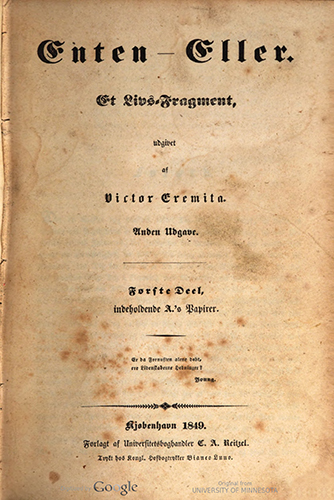12 Danish

Although he had previously written a handful of articles, a book length review of a Hans Christian Andersen novel, and a magister dissertation on irony, the Danish philosopher, theologian and litterateur Søren Kierkegaard (1813–1855) considered Enten – Eller (Either/Or) to be the first work of his authorship proper. Under the pseudonym Victor Eremita, Kierkegaard published the two-volume novel with C. A. Reitzel in 1843. Kierkegaard published under pseudonyms so that the reader would not turn to him as an authority on how to interpret and live out the works. Henriette Wulff wrote from Copenhagen to H. C. Andersen in Germany, “Recently a book was published here with the title Either/Or! It is supposed to be quite strange, the first part full of Don Juanism, skepticism, et cetera, and the second part toned down and conciliating, ending with a sermon that is said to be quite excellent. The whole book has attracted much attention.”1 By the standards of the small Danish book market, it sold well, and went into a second edition in 1849. The second edition is of especial interest because archival evidence indicates that Kierkegaard gave a gift copy of it to H. C. Andersen. This gesture can be seen as a rapprochement, since Kierkegaard’s 1838 review of Andersen’s Kun en Spillemand (Only a Fiddler) was quite scathing. Previously, Andersen had tried to show that there were no hard feelings by gifting Kierkegaard a copy of his Nye Eventyr (New fairytales), but Kierkegaard made no reply. Unfortunately, Andersen’s copy of the second edition of Enten – Eller is believed to be no longer extant. (In 2001, Niels Lillelund published a Nordic Noir novel entitled Den amerikanske samler [The American collector], which follows a bookstore owner’s pursuit of this priceless item.)
Enten – Eller has been translated into English, Spanish, Russian, and Chinese, as well as into a number of other languages. In addition to having online access to the second edition, the UC Berkeley Library has a hardcopy of the fourth edition in its holdings.
Danish is spoken by roughly six million people around the world. The Department of Scandinavian at UC Berkeley regularly offers courses in both the Danish language and in Danish literature in translation. The Danish language is taught by Senior Lecturer Karen Møller, and Danish literature is taught by Professor Karin Sanders. In the fall of 2018, Scandinavian 180, “The Works, Context, and Legacy of Søren Kierkegaard” introduced a group of students to Kierkegaard, the Danish Golden Age, and the author’s influence on twentieth-century philosophy and world literature. The course was taught by the author of this essay.
Contribution by Troy Smith
PhD Student, Department of Scandinavian
Sources consulted:
- Quoted in Joakim Garff, Søren Kierkegaard: A Biography, trans. Bruce H. Kirmmse (Princeton, NJ: Princeton University Press, 2007), 216–17.
Title in English: Either/Or
Author: Victor Eremita, pseudonym for Søren Kierkegaard (1813–1855)
Imprint: Kjøbenhavn, C.A. Reitzel, 1849.
Edition: 2nd edition
Language: Danish
Language Family: Indo-European, Germanic
Source: HathiTrust Digital Library (University of Minnesota)
URL: https://hdl.handle.net/2027/umn.31951d02153608j
Select Print editions at Berkeley:
Enten – eller. Et livs-fragment, udg. af Victor Eremita [pseud.]. 4. udg. Kjøbenhavn, C. A. Reitzel, 1878.

